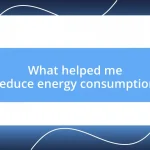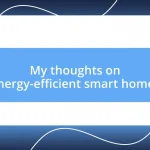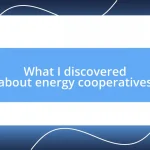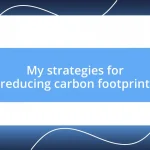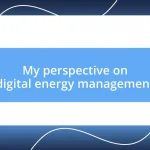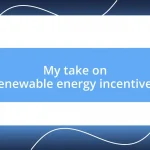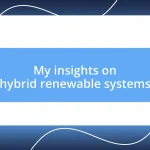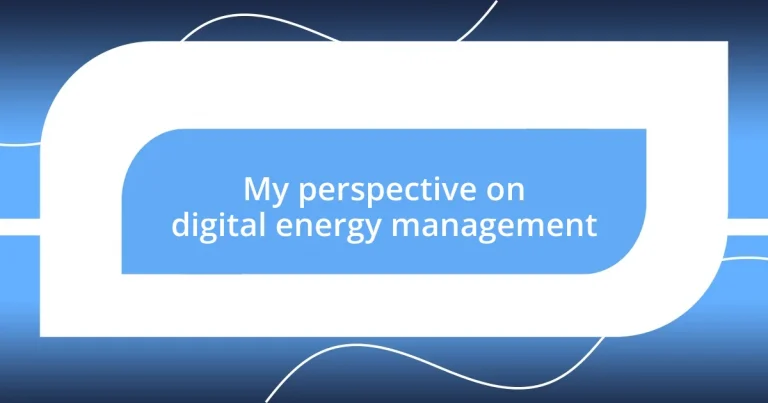Key takeaways:
- Digital energy management empowers users by providing real-time insights into energy consumption, enabling smarter habits and lower costs.
- Energy efficiency is a collective responsibility that fosters community engagement and significantly reduces environmental impact.
- Key technologies, like smart meters and energy management systems, facilitate effective energy monitoring and management, ultimately leading to substantial savings and sustainability.”
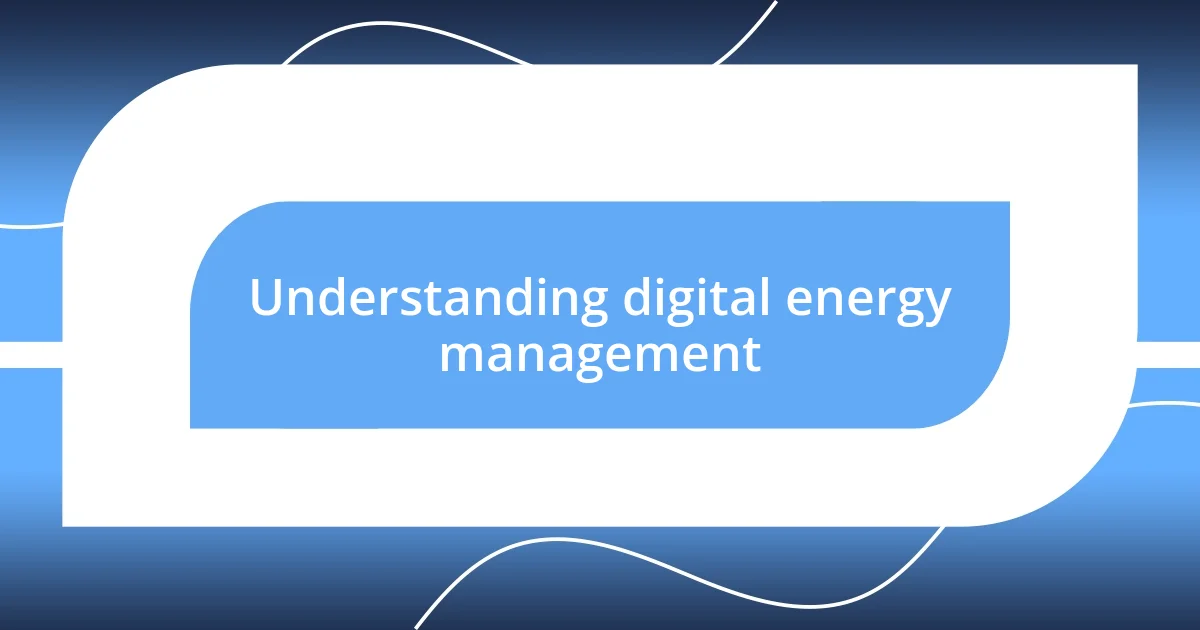
Understanding digital energy management
Digital energy management is more than just a tool; it’s a holistic approach to how we consume and track energy in our everyday lives. I remember the first time I used a digital energy management system in my own home. It felt empowering to visualize my energy usage in real-time – it was like turning on a light in a dim room. Have you ever noticed how small changes in habits can make a significant difference?
As I dug deeper into the world of digital energy management, I discovered its potential to analyze patterns and predict future consumption. For instance, when I monitored my energy usage over a month, I realized that my peak times aligned with specific habits, like doing laundry on weekends. This insight allowed me to adjust my behavior and keep my costs down. Isn’t it fascinating how understanding our consumption can lead to smarter choices and even more savings?
In a broader context, digital energy management integrates data analytics, smart meters, and automated systems, essentially transforming how organizations operate. Just think about how this technology can not only help companies reduce costs but also minimize their carbon footprint. It’s about creating an energy-efficient future, and I can’t help but feel excited about the possibilities. How do you envision your energy consumption changing in response to these technological advancements?
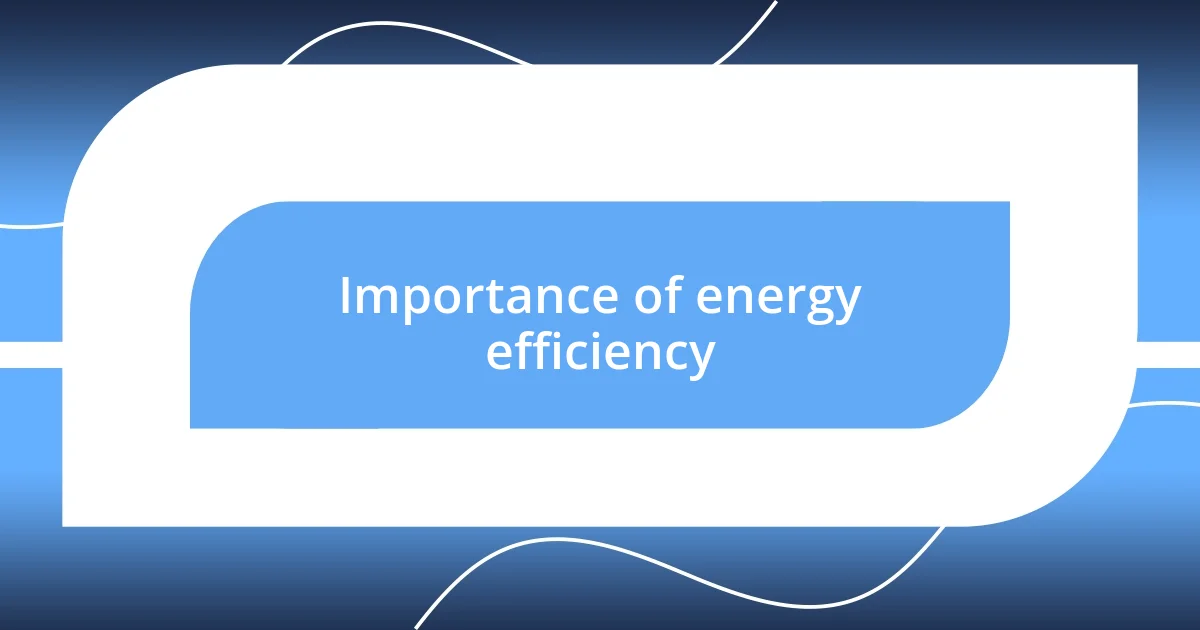
Importance of energy efficiency
Energy efficiency is crucial because it enables us to do more with less, promoting sustainability and reducing our environmental impact. Reflecting on my own journey, I was once shocked by how much energy my household waste could save simply by switching to energy-efficient appliances. It felt rewarding to see my energy bill drop, but the knowledge that I was contributing to a healthier planet sparked an even deeper sense of fulfillment. Have you ever felt that thrill when taking a simple action that benefits the environment?
Moreover, becoming energy-efficient can significantly improve economic stability. I remember participating in a community initiative focused on educating residents about energy-saving practices. The collective effort not only bolstered our local economy but also fostered a sense of community pride and cooperation. When we work together, we amplify the impact of our individual actions. Isn’t it amazing how something as simple as sharing tips can lead to tangible, positive change?
It’s clear that energy efficiency isn’t just a personal choice; it’s a collective responsibility. The more I consider the importance of energy efficiency, the more I appreciate its role in combating climate change. Each small step, such as choosing renewable energy sources or minimizing waste, propels us toward a brighter future. It’s all about creating a culture of mindfulness around energy, and I’m thrilled to be a part of it.
| Benefits | Examples |
|---|---|
| Cost Savings | Lower energy bills from energy-efficient appliances |
| Environmental Impact | Reduced carbon footprint through energy conservation |
| Community Engagement | Neighborhood initiatives promoting shared energy-saving strategies |
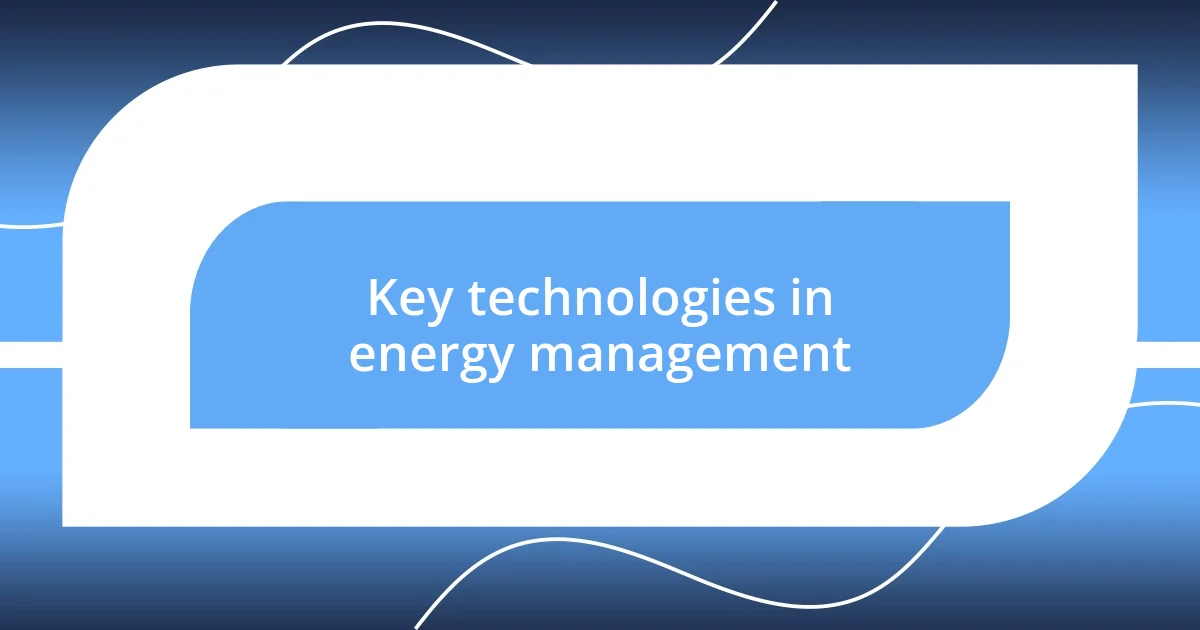
Key technologies in energy management
Key technologies in energy management harness the power of data to optimize energy usage. From my experiences, I’ve found that technologies like smart meters and energy management systems create a level of transparency that’s invaluable. For instance, when I first installed a smart meter, I was amazed to see how real-time monitoring of my usage informed my decisions. It led to a noticeable reduction in my monthly bills, which felt incredibly satisfying.
Here are some key technologies that are revolutionizing energy management:
- Smart Meters: Allow consumers to monitor energy consumption in real-time, providing insights into usage patterns.
- Building Management Systems (BMS): Centralized systems that automate and control energy-consuming devices in buildings, enhancing efficiency.
- Energy Management Software: Analyzes data to highlight inefficiencies and provides actionable recommendations for reducing energy consumption.
- Demand Response Technology: Adjusts energy consumption during peak periods in response to signals from utilities, helping to balance load and cut costs.
- IoT Devices: Integrate seamlessly into homes and businesses, enabling smarter energy management through connected appliances.
As I explore these technologies, I can’t help but feel a sense of optimism about their potential. When I integrated an energy management software into my home routine, it was like having a personal energy coach guiding me toward smarter decisions. These tools not only empower individual consumers but also pave the way for larger organizations to make impactful changes. It’s a reminder that technology, when used wisely, can lead to a more sustainable and responsible approach to energy consumption.
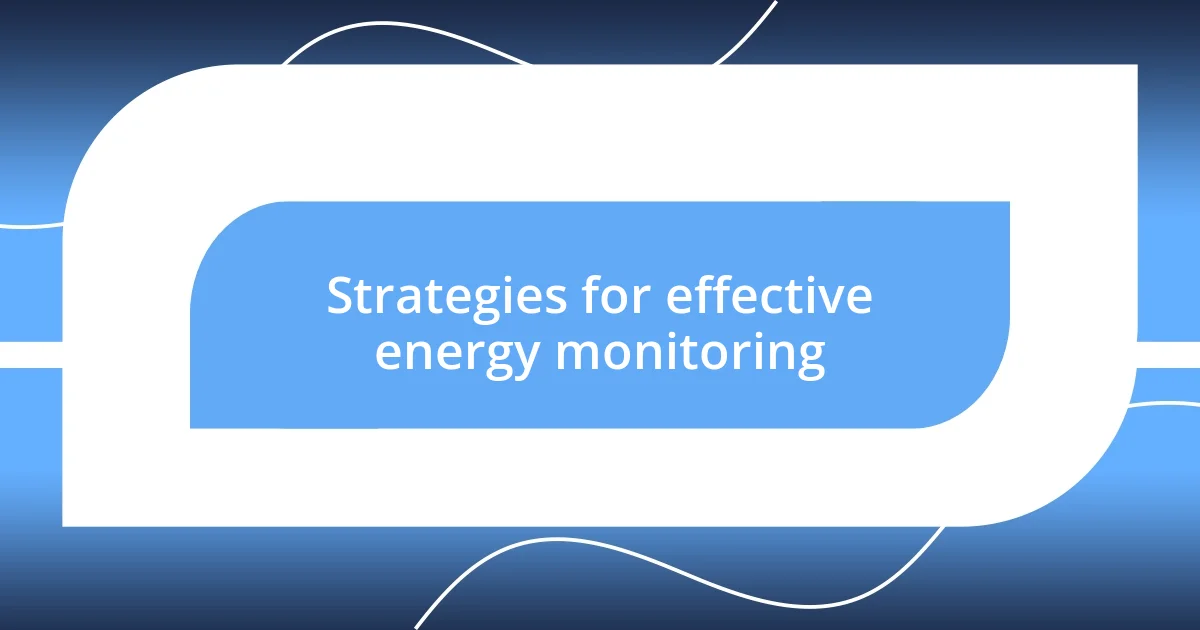
Strategies for effective energy monitoring
Monitoring energy usage is essential for making informed decisions that can lead to significant savings. One effective strategy I found is setting specific energy goals, like reducing consumption by 15% over six months. This tangible target motivated me to track my usage closely, and it was a small victory every time I met my monthly goal. How satisfying is it to witness your efforts directly translate into savings?
Another key approach is to utilize data analytics for deeper insights. I vividly remember using energy management software that offered not just usage stats but also suggestive insights based on my habits. For instance, it highlighted that my peak consumption surged during certain hours. By simply adjusting my usage to off-peak times, I not only reduced my bills but also contributed to a more stable grid. Have you ever realized how small shifts in behavior can lead to substantial benefits?
Lastly, engaging everyone in the household boosts the effectiveness of energy monitoring. When I involved my family in making energy-saving decisions, it transformed our collective mindset. We created friendly competitions around who could use the least energy, and suddenly, everyone was more conscious of their habits. Isn’t it incredible how teamwork can enhance both awareness and action in energy management?
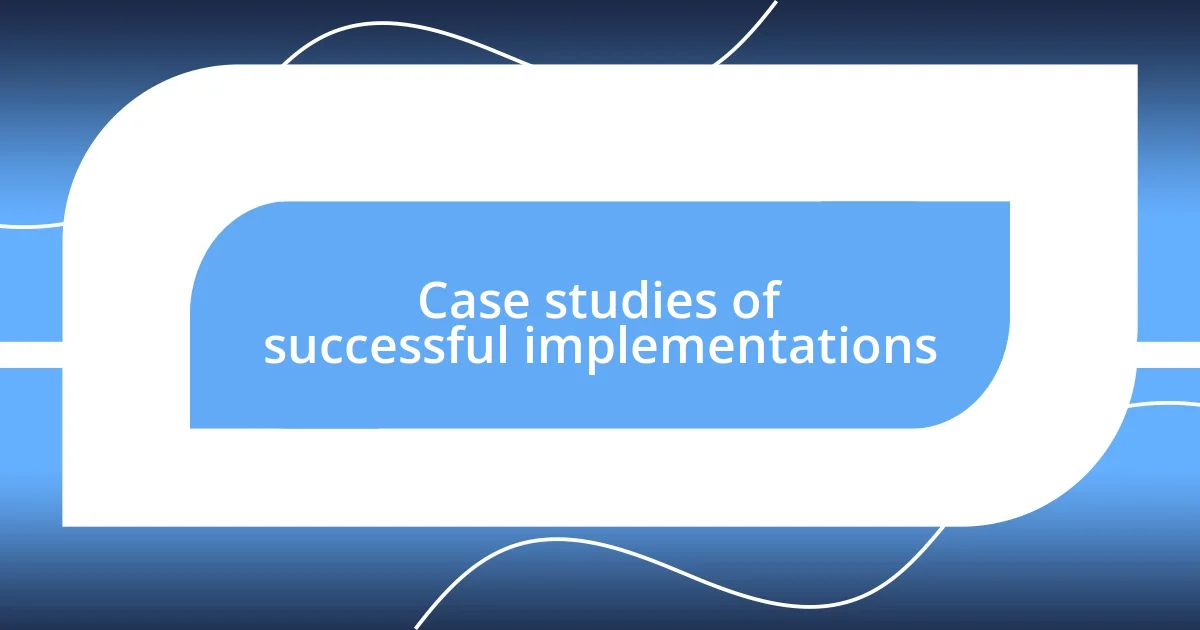
Case studies of successful implementations
When I think about successful implementations of digital energy management, one standout example is a local manufacturing facility that adopted a Building Management System (BMS). Initially, they were struggling with high energy costs and inefficiencies that seemed almost insurmountable. However, after integrating the BMS, they documented a 25% reduction in energy consumption within the first year. It was inspiring to see how technology, combined with a proactive approach, transformed their operational costs into savings that could be reinvested.
Another case that struck a chord with me is a community housing project that incorporated smart meters for each unit. Residents were somewhat skeptical at first, fearing that increased visibility might lead to higher bills or invasive reporting. However, after just a few months, the feedback changed dramatically. People began to understand consumption patterns and engage in energy-saving practices as a community, leading not only to a significant reduction in total energy use but also fostering a sense of collaboration that was quite heartening. Have you ever experienced that moment of collective realization when everyone comes together for a common goal?
Finally, I remember reading about a tech startup that utilized demand response technology. They embraced it to shift their heavy energy usage to off-peak hours. This not only slashed their bills, but it also allowed them to play a role in stabilizing the grid, which feels rewarding. Witnessing firsthand how a single decision can ripple through the entire energy ecosystem is profound. It raises the question: how can we, as individuals and organizations, replicate such success in our energy management practices?



